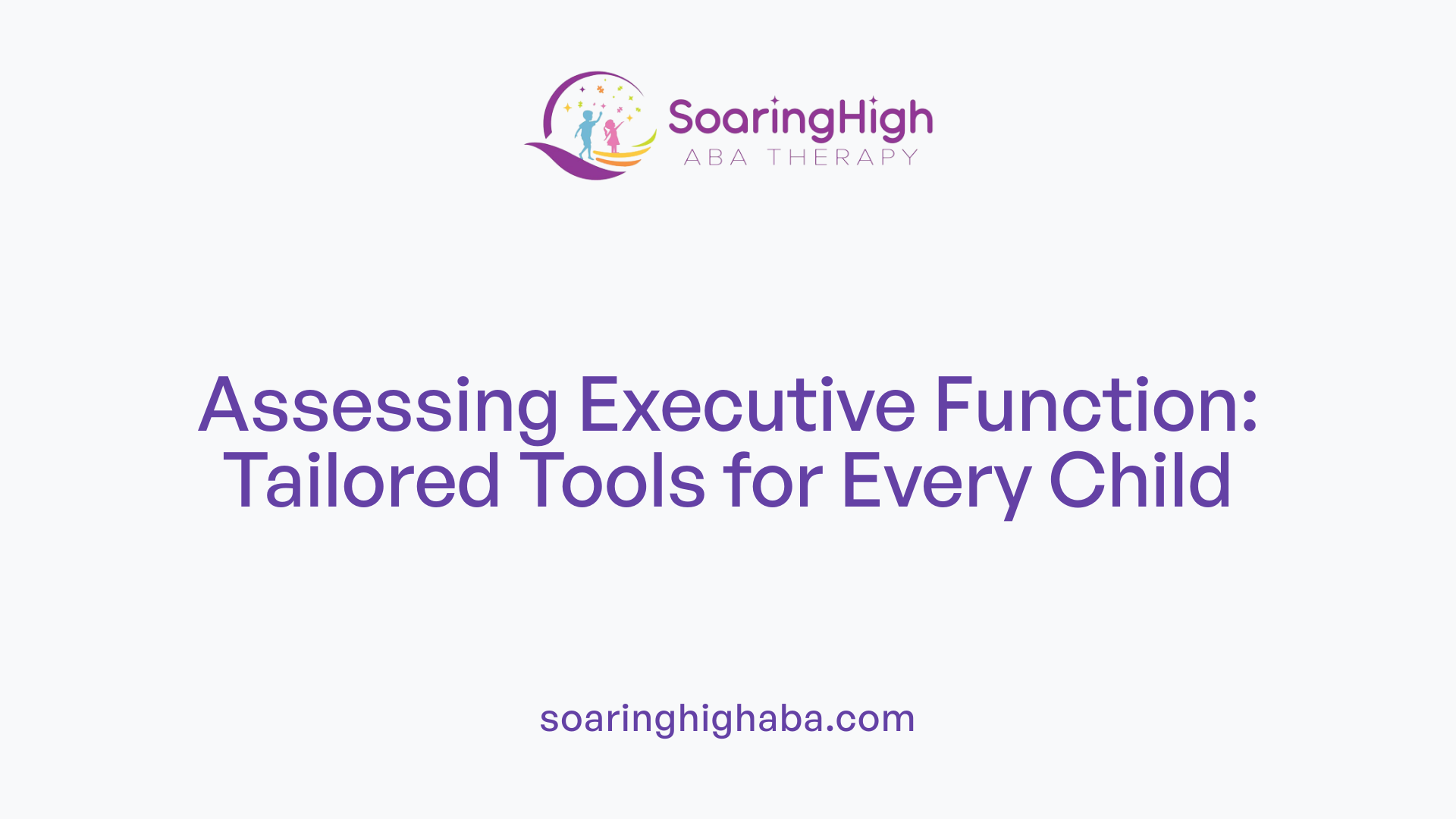Understanding Executive Dysfunction and Its Impact
Executive functioning deficits significantly affect children’s daily lives, influencing their ability to plan, organize, and regulate emotions. These challenges are prevalent among children with autism spectrum disorder (ASD) and conditions like ADHD. Addressing these deficits is crucial for fostering independence, improving social interactions, and enhancing learning outcomes. ABA therapy has emerged as an effective, evidence-based approach that offers tailored interventions to support and develop essential executive skills in children.
Assessment of Executive Function in Children

How are children’s executive function deficits assessed?
Understanding a child's executive functioning abilities is essential for designing effective ABA interventions. Assessments combine multiple methods to paint a comprehensive picture of each child's strengths and challenges.
One primary approach involves performance-based tests. These standardized cognitive tasks evaluate specific skills such as working memory, inhibition, cognitive flexibility, and planning. Examples include the Digit Span test, which measures working memory capacity; the Stroop Test, assessing inhibitory control; the Trail Making Test, which evaluates task-switching ability; the Wisconsin Card Sorting Test, for flexibility; and the CANTAB battery, which covers a range of executive functions.
In addition to these controlled tasks, rating scales like the BRIEF-2 (Behavior Rating Inventory of Executive Function, Second Edition) and BASC (Behavior Assessment System for Children) provide valuable insight into how children perform in daily settings. These tools gather observations from caregivers and teachers, helping therapists understand real-world executive functioning issues such as organization, emotional regulation, and impulse control.
Behavioral observations play a crucial role within naturalistic environments, allowing clinicians to assess how children handle routine tasks and social interactions. These observations often happen during sessions where children demonstrate their skills and struggles in less structured contexts.
Developmental evaluations complement cognitive and behavioral assessments by considering the child's overall growth trajectory. These evaluations include developmental history and milestones, helping to contextualize executive function within the child's broader developmental profile.
Together, these assessment methods provide a multi-faceted view of a child's executive functioning. Understanding the specific areas of difficulty allows clinicians to tailor ABA strategies effectively, focusing on strengths while addressing challenges.
What assessment tools are most useful?
| Tool Name | Focus Area | Description |
|---|---|---|
| BRIEF-2 | Everyday executive function | Rating scale for caregivers and teachers to report behaviors related to organization, emotional regulation, and task management |
| BASC | Behavior in daily life | Broad assessment covering behavior, social skills, and executive functions |
| Stroop Test | Inhibition | Measures ability to suppress automatic responses |
| Wisconsin Card Sorting Test | Flexibility | Assesses ability to adapt to changing rules |
| Trail Making Test | Task switching | Evaluates cognitive flexibility and visual-motor integration |
| CANTAB | Multiple EF skills | Battery with various computerized assessments |
Embedding assessment results into treatment planning
The findings from these assessments guide tailored intervention plans. For example, if a child demonstrates difficulties with working memory, ABA therapists might incorporate activities like treasure hunts or visual memory games.
By combining standardized testing with real-world observations and developmental history, clinicians can pinpoint which skills need targeted support. This comprehensive approach ensures that interventions effectively build executive functions and improve daily functioning.
Additional considerations
Assessment also involves culturally sensitive practices and ongoing monitoring. As children develop or respond to interventions, reassessments using the same tools and observations help track progress and adjust strategies accordingly.
In conclusion, assessing executive functions in children through diverse, validated methods provides the foundation for personalized ABA therapy that enhances independence and overall well-being.
How ABA Therapy Supports Executive Function Development
How does ABA therapy support children with executive function deficits?
ABA therapy plays a vital role in helping children with challenges in executive functioning—skills like planning, organization, working memory, and self-regulation. It uses evidence-based methods tailored to each child's specific needs, focusing on observable behaviors that impact daily life.
Initially, behavior analysts perform assessments with tools such as BRIEF-2, BASC, and naturalistic observations to understand where the child struggles most. They then develop customized treatment plans that prioritize interventions targeting the most impactful deficits, like difficulties in task initiation or emotional control.
To teach these complex skills, ABA therapy breaks down tasks into smaller, more manageable steps. For example, a child might learn to plan their day with visual schedules or use structured routines to foster organization. Embedding learning into play and preferred activities helps make these skills concrete and engaging.
Positive reinforcement techniques are central to ABA strategies. These include prompting, shaping, and gradually fading support as children gain independence. Reinforcement encourages initial attempts and persevering through challenges.
Monitoring progress is crucial. Therapists gather continuous data during sessions and across environments like home and school. This ongoing assessment helps tailor interventions and ensures skills are generalized, meaning children can apply them in various settings.
Involving parents, caregivers, and educators enhances consistency and facilitates skill transfer beyond therapy sessions. Overall, ABA therapy aims to boost daily functioning and promote independence by systematically strengthening executive skills through targeted, supportive interventions.
Supporting Children with Autism and EF Challenges

How can ABA therapy aid children with autism who have executive function deficits?
ABA therapy offers a comprehensive approach to support children with autism facing executive function (EF) difficulties. By developing personalized intervention plans, therapists focus on enhancing specific skills such as planning, flexibility, memory, and impulse control.
One key method involves establishing structured routines and visual tools. These structured routines help children anticipate and understand daily tasks, reducing anxiety and improving organization. Visual aids like visual schedules and checklists are particularly effective in making tasks concrete and observable, which helps children grasp what needs to be done.
Breaking complex tasks into smaller, manageable steps is another vital strategy. For example, a larger task like cleaning up can be split into individual steps, such as picking up toys, putting them in the bin, and tidying up the area. This approach makes large skills less overwhelming and easier to master.
ABA leverages various practical tools, including technology-based visual schedules and apps like Choiceworks or color-coded calendars. These tools support planning and time management, empowering children to become more independent.
Real-world examples reinforce these strategies. Activities like ‘Red Light, Green Light’ help teach inhibitory control, while treasure hunts can boost working memory. These engaging experiences embed skills into play, making learning enjoyable and effective.
In addition to these techniques, ABA incorporates reinforcement strategies to motivate learning. Positive reinforcement, such as praise or token systems, encourages children to practice and generalize new skills across settings.
Overall, ABA therapy enables children with autism and EF challenges to develop crucial independence skills. It fosters self-regulation and problem-solving abilities, ultimately improving their overall daily functioning and quality of life.
Techniques and Strategies to Improve Executive Functions in ABA

What strategies and interventions are used in ABA therapy to improve executive functioning?
ABA therapy incorporates a range of proven techniques designed to help children develop and strengthen executive functioning skills. Central to these strategies is task analysis, where complex skills are broken into smaller, manageable steps. This approach makes learning more accessible and helps children master each sub-skill progressively.
Visual supports are also a core component, including visual schedules, picture-based cues, and color-coded tools that aid in planning, organization, and understanding routines. Such supports make abstract concepts concrete and observable, facilitating better comprehension and task completion.
Structured routines and visual schedules play a vital role in establishing predictability, reducing anxiety, and fostering independence. These routines can be reinforced with timers, checklists, or visual timers, aiding children in managing time and transitions effectively.
Reinforcement systems are tailored to individual preferences and include both natural reinforcement—like praise or access to preferred activities—and structured reinforcement schedules such as token economies. These systems motivate children to practice and internalize desired behaviors.
Beyond these, ABA therapy emphasizes embedding problem-solving activities within play to promote cognitive flexibility. Using engaging activities like treasure hunts or game-based exercises encourages children to apply executive skills such as working memory and inhibitory control.
Assessments such as the BRIEF-2 are employed to identify specific weaknesses in executive functions, guiding personalized intervention plans. This data-driven approach ensures targeted strategies are used to address particular challenges.
Examples of practical tools include visual schedules, checklists, and apps like Choiceworks, which support daily planning and task management. These tools help children generalize skills across different settings, such as home and school.
In short, ABA therapy systematically combines these interventions—task analysis, visual supports, routines, and reinforcement—creating a comprehensive framework to promote executive functioning, enhance daily living skills, and foster independence in children with autism.
Specific Techniques within ABA for Executive Skills Enhancement
What techniques within ABA therapy are used to enhance executive functioning skills?
Applied Behavior Analysis (ABA) employs a variety of targeted methods to strengthen executive skills such as planning, organization, self-regulation, and flexible thinking. These techniques are tailored to each child's unique needs, ensuring effective development of daily living skills.
A foundational approach is task analysis, which involves breaking complex activities into smaller, manageable steps. For example, teaching a child to prepare a simple snack might involve steps like opening the fridge, retrieving ingredients, and assembling the snack. This process helps children understand and sequence actions independently.
Visual supports such as charts, schedules, and visual cues are integral to ABA. These aids help children comprehend expectations, manage their time, and stay organized. Visual routines can be as simple as picture-based timetables or reinforced checklists, making abstract concepts more concrete.
Positive reinforcement plays a central role in encouraging desired behaviors. When children initiate tasks, follow schedules, or demonstrate emotional regulation, they receive praise, tokens, or preferred activities that motivate continued effort and perseverance. Reinforcement is tailored to each child's preferences and tailored to promote behaviors that foster independence.
To teach social and cognitive flexibility, ABA integrates role-playing, social narratives, and video modeling. For instance, role-playing scenarios like sharing toys or handling conflicts help children practice adaptive responses. Social stories narrate specific situations, providing children with script-like scenarios that promote understanding and appropriate reactions.
Naturalistic teaching strategies embed skill development into everyday routines. For example, during free play or mealtime, therapists or caregivers incorporate targeted activities that foster initiative, patience, or problem-solving. These teaching moments are spontaneous and relevant, increasing the likelihood of skill generalization.
Effective ABA therapy also involves collaborating with stakeholders—parents, teachers, and caregivers—to ensure consistency across environments. Practicing skills in varied settings and with different people encourages transferability and long-term retention.
To evaluate progress and tailor interventions, ongoing data collection and analysis are vital. This allows for adjustments and ensures that the methods effectively enhance particular executive functions such as working memory, planning, and emotional regulation.
Overall, these techniques work synergistically to develop executive functioning skills that support children’s independence and success in daily life, education, and social relationships.
Benefits and Outcomes of ABA Therapy for EF Challenges
How does ABA therapy improve daily living skills?
ABA therapy plays a crucial role in helping children develop essential daily living skills by focusing on personalized goals and structured teaching methods. Therapists create tailored treatment plans that break down complex skills like planning, time management, and emotional regulation into small, manageable steps. Using techniques such as visual schedules and routines, children learn to carry out tasks independently.
In practice, this might involve set routines with visual prompts or practice activities like
Role of ABA in Addressing Broader Developmental Challenges

What role does ABA therapy play in addressing developmental and behavioral challenges related to executive functioning?
ABA therapy is instrumental in supporting children with autism and other developmental conditions by creating structured, individualized interventions. It helps children develop vital executive skills such as planning, organization, problem-solving, emotional regulation, and task initiation.
Using evidence-based techniques like positive reinforcement, visual schedules, and routines, ABA makes these skills concrete and observable, facilitating learning and mastery.
One effective approach involves embedding exercises into play, activities, and daily routines. For example, games like 'Red Light, Green Light' improve inhibitory control, while treasure hunts work on working memory.
Assessment tools like the BRIEF-2 and BASC help identify specific deficits in executive functions. Observations in natural settings also guide targeted interventions, ensuring they are tailored to each child's unique needs.
ABA therapy employs a structured five-step framework: assessment, goal prioritization, breaking behaviors into manageable steps, embedding skills into play, and promoting generalization across settings and caregivers.
This comprehensive approach aims to boost independence, improve social skills, and enhance daily functional abilities. By fostering these skills, ABA therapy significantly contributes to better overall outcomes for children facing executive functioning challenges.
Family and Community Support for EF Development

How do structured environments support executive functioning (EF) development?
Structured environments are essential in helping children develop strong EF skills. These settings often incorporate visual schedules, routines, and clear expectations, which create predictability and reduce anxiety. For example, visual supports like color-coded calendars or daily checklists enable children to understand and anticipate their daily activities. This clarity helps improve planning and organization.
Additionally, visual tools and structured routines facilitate cognitive flexibility, allowing children to adapt more easily to changes in their routine. Such environments foster independent skill-building by providing consistent cues and reinforcement, which make learning new skills more manageable.
How do stakeholders collaborate to promote EF skills?
Incorporating a team approach is vital. Parents, teachers, therapists, and caregivers collectively work together, sharing observations and creating consistent strategies across settings. Collaboration ensures that interventions are tailored to each child's unique needs and that skills learned in one environment transfer to others.
Regular communication and goal-setting sessions are helpful. For example, teachers and therapists can coordinate activities that reinforce skills like impulse control or working memory. Family involvement is especially critical in everyday activities at home, where children can practice routines and receive positive reinforcement.
How can fostering independence support EF skill development?
Fostering independence involves teaching children to manage tasks with minimal supervision over time. Breaking complex tasks into manageable steps allows children to build confidence while practicing their planning and problem-solving skills.
Support strategies include using visual aids like choice boards, timers, or apps such as Choiceworks that help children organize their activities. Encouraging self-monitoring and reward systems can motivate children to complete tasks independently.
Creating opportunities for children to make decisions, solve problems, and reflect on their actions helps develop self-regulation and emotional resilience. These experiences lay the groundwork for more advanced executive skills, such as goal setting and flexible thinking.
How do environments and collaboration contribute to overall EF growth?
A cohesive approach combining structured environments and stakeholder collaboration creates a supportive network that promotes sustained EF development. When everyone involved communicates openly and uses consistent approaches, children experience a stable foundation for learning.
This consistency across settings enhances generalization of skills, reduces confusion, and builds motivation. Over time, children become more confident and capable of managing their daily routines, leading to greater independence and improved quality of life.
Below is a summary table illustrating the different ways structured environments, stakeholder involvement, and fostering independence interconnect to support executive function development:
| Aspect | Approach | Example | Benefit |
|---|---|---|---|
| Structured Environments | Use of visual schedules, routines | Color-coded calendars, visual timers | Reduces anxiety, increases predictability |
| Stakeholder Involvement | Collaborative planning and communication | Team meetings, shared goals | Consistent interventions, skill transfer |
| Fostering Independence | Step-by-step task breakdown | Choice boards, apps like Choiceworks | Builds confidence, promotes self-regulation |
By combining these strategies, families and communities can create a nurturing environment that fosters the development of vital executive functions, enabling children to achieve greater independence and success in their daily lives.
Conclusion: Building the Foundation for Future Success
Embracing a Personalized and Whole-Child Approach
Implementing ABA therapy for children with executive function (EF) deficits involves crafting tailored treatment plans that address individual strengths, needs, and specific challenges. This holistic perspective recognizes that each child is unique, requiring interventions that integrate behavioral techniques with understanding of emotional, sensory, and cognitive profiles. For example, using visual schedules, task breakdowns, and targeted reinforcement strategies can help enhance skills like planning, impulse control, and flexible thinking. This comprehensive approach ensures that interventions are not only focused on skill acquisition but also promote emotional regulation, resilience, and overall well-being.
The Value of Ongoing Assessment and Adjustment
Continuous evaluation is fundamental to effective ABA interventions. Tools such as BRIEF-2 and BASC, along with naturalistic observations, enable therapists and caregivers to monitor progress systematically. This ongoing assessment helps identify what strategies work best and where adjustments are needed. As children develop, their needs may change, requiring modifications to goals, reinforcement schedules, or teaching methods. Regular data collection and collaboration with families ensure that interventions stay aligned with the child's evolving capabilities and circumstances, maximizing the likelihood of meaningful growth.
Striving Toward Independence and Well-Being
The ultimate goal of ABA therapy for children with EF challenges is to foster independence and allow them to thrive in daily life. Building foundational skills—such as time management, task completion, emotional regulation, and social interaction—can empower children to participate confidently in educational settings, community activities, and family life. By embedding skills into everyday routines and environments, therapists help children generalize learned behaviors across different contexts. This focus on functional, real-world skills aims to produce not just immediate improvements, but lifelong benefits that support a well-rounded, adaptable, and resilient individual.
Fostering Independence through Tailored Support
Supporting children with executive function deficits through ABA therapy is a comprehensive, individualized process that focuses on measurable outcomes and lasting skills. By leveraging assessment tools, evidence-based strategies, and collaborative efforts, ABA helps children develop the planning, organization, emotional regulation, and problem-solving skills essential for independence and success. The ongoing process of assessment and adaptation ensures that interventions remain relevant and effective, empowering children to navigate daily challenges confidently. Ultimately, ABA therapy acts as a cornerstone in fostering resilience and enabling children with executive function deficits to thrive academically, socially, and at home.
References
- ABA Therapy for Executive Dysfunction - Award Behavioral Health
- Unlocking Independence: Teaching Executive Functioning Skills ...
- Strategies to Support Autism Executive Function
- Tackling Challenges from Executive Functioning to Emotional ...
- Unlocking Independence: Teaching Executive Functioning Skills ...
- Evidence Based Interventions for Executive Functioning
- ABA Therapy for Executive Dysfunction - Award Behavioral Health
- ABA Therapy for Leadership Skills: Empowering Children





































































































